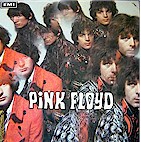
Genre: psych
Rating: **** (4 stars)
Title: The Pipers At the Gates of Dawn
Company: EMI / Fame
Catalog: FA 3065
Year: 1967
Country/State: UK
Grade (cover/record): VG / VG
Comments: mid-1980s reissue
Available: 1
GEMM catalog ID: 5266
Price: $20.00
There are literally miles of printed and online material
covering the ‘birth’ of Pink Floyd.
In the interests of time, the executive summary goes something like
this. Singer/guitarist Syd
Barrett, guitarist/bassist Roger Waters, and keyboardist Rick Wright met
when in the early 1960s when they were attending high school in Cambridge
England. Graduating, Wright
went to London’s Regent Street Polytech to study architecture where he
hooked up with classmates Nick Mason (drums) and Rick Wright (keyboards),
bassist Clive Metcalf and singers Juliette Gale and Keith Nobel to form the
R&B cover band Sigma 6. With
lead guitarist Bob Close replacing Metcalf, Rogers switched over to bass and
Sigma 6 morphed in The T-Set, the The Architectural Abdabs, and The
(Screaming) Abdabs. Barrett was attending London’s Camberwell School of the
Arts and in 1965 Rogers asked him to join the band.
Unfortunately, artistic and personality clashes saw band collapse.
Barrett, Mason, Rogers and Wright quickly regrouped as The Pink Floyd
Sound (Barrett’s inspiration for the name reportedly coming from a pair of
favorite LPs by Georgia blues artists Pink Anderson and Floyd Council.
With Barrett serving as frontman and backed by one of rock’s
earliest light shows, the band made their 1966 debut at London’s The
Countdown Club. By the end of
the year they were regulars on the city’s club circuit with regular
performances at The Marquee Club, The Roundhouse, The UFO Club, etc.
They’d also become poster children for the UK’s summer of love
psychedelic movement.
Finding a sponsor in the form of managers Peter Jenner and
Andrew King, they began recording demos with producer Joe Boyd (co-owner of
The UFO Club).
Signed by Columbia/EMI, the band debuted with the single
‘Arnold Layne’ b/w ‘Candy and a Currant Bun’ (Columbia/EMI catalog
number DB 8156). A weird mix of
English folk an psych, Barrett’s lyric about a transvestite with a fetish
for stealing women’s underwear from washing lines somehow escaped a BBC
airplay ban and managed to go top-20.
Originally entitled ‘Games for May’ (inspired by a show they’d played at London’s Queen Elizabeth Hall), their follow-up ‘See Emily Play’ b/w ‘Scarecrow’ (Columbia/EMI catalog number DB 8214) did even better, going top-10 in the UK.
As was standard marketing, EMI rushed the band into the
studio to record and LP. Produced
by Norman ‘Hurricane’ Smith (the album was recorded at Abbey Roads
Studios at the same time The Beatles were working on Sgt. Pepper), musically
the set offered up something that was radically different than anything on
the market. Largely penned by
Barrett, tracks like the wildly experimental opener ‘Astronomy Domine’,
the rocking ‘Lucifer Sam’ and the folk-ish ‘Flaming’ (one of the few
tracks that is aptly described as folk-psych), served to showcase his
substantial musical gifts, but increasingly troubled sense of realty.
A uniquely weird mix of English folk, rock, child like simplicity and
lysergenic meltdown, it was simply hard to compare Barrett’s material to
anything else on the market. At the other end of the musical spectrum the
two group-penned songs showcased longer, far more experimental efforts that
served to foreshadow their post-Barrett catalog. Ironically the album was so
different that it was commercial. Even
the two group penned numbers; the spacey ‘Po R. Toc H’ and the classic
meltdown instrumental ‘Interstellar Overdrive’ were captivating and
remain a blast to hear with good headphones.
Hard to imagine what these two freakouts must have sounded like to
folks accustomed to Merseybeat and top-40 radio.
The only album to truly showcase Barrett who would find himself in
forced ‘retirement’ within a year, it’s also one of the band’s
creative zeniths. Note
that the original American release (Tower catalog number ST-5093) featured
an abbreviated track line up.
(side 1)
1.) Astronomy Domine
(Syd Barrett) –
2.) Lucifer Sam (Syd
Barrett) –
3.) Matilda Mother
(Syd Barrett) –
4.) Flaming
(Syd Barrett) –
5.) Po R. Toc H. (instrumental)
(Syd Barrett – Roger Waters – Rick Wright – Nick Mason) –
6.) Take Up Thy Stetohscope and Walk (Roger Waters)
(side 2)
1.)
Interstellar Overdrive (instrumental)
(Syd Barrett – Roger Waters – Rick Wright – Nick Mason) –
2.) The Gnome (Syd
Barrett) –
3.) Chapter 24 (Syd
Barrett) –
4.) The Scarecrow (Syd Barrett) –
5.) Bike (Syd
Barrett) -
Like any good band, in support of the album The Floyd hit the
road. A short Irish tour went
off without issues, but when the band hit the States the wheels started to
come off their train. An
appearance on American Bandstand proved disasterous when Barrett refused to
lip synch ‘Arnold Lane’ (technically he did lip synch, but refused to
move his lips in time with the vocal track).
Other promotional efforts including an appearance on the Pat Boone
show proved equally dismal with Barrett acting totally stoned.
Perhaps not a big surprise, their US tour was abruptly cancelled
before it even started.
Back in the UK, November 1967 saw the release if a third
non-LP 45 ‘Apples and Oranges’ b/w ‘Paint Box’ (Columbia/EMI catalog
number DB 8310). Far more
experimental that the first two singles, the 45 didn’t chart, though that
didn’t stop EMI from sending them back out on the road as part of a
package tour. Unfortunately the
wear and tear of touring didn’t exactly help Barrett whose continuing use
of LSD made him increasingly unstable and unreliable.
Increasingly unable to function on tour, by early 1968 ex-The
Ramblers/Jokers Wild guitarist David Gilmour was brought in as a touring
replacement. In April 1968
Barrett was formally asked to leave the band.
